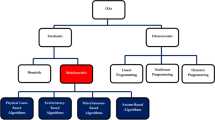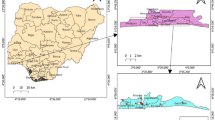Abstract
The optimal power flow (OPF) problem is very important issue in operation, planning and energy management of power systems. OPF analysis aims to find the optimal solution of system nonlinear algebraic equations with satisfying operational constraints. Economic, environmental and technical objectives are considered for multi-dimensions efficient energy management. These objectives involve the reduction of the production costs, reduction of the environmental emissions, improving the voltage profile, reducing the power losses and enhancing the system stability. This paper presents a new high-efficiency technology that proposes a multi-objective version of the recently proposed moth swarm algorithm (MSA) i.e. enhanced MSA (EMSA). The modification is implemented based on quasi-opposition-based learning. In order to verify the efficacy of proposed EMSA, the simulations are done in the IEEE 30-bus and IEEE 57-bus test systems. The scalability of the proposed method is proved on the IEEE 118-bus test network. The outcomes are compared with that obtained by MSA and the reported methods in the literature. From the outcomes obtained, it is strongly confirmed that proposed EMSA performs considerably better than MSA to address different test objectives with significant improvements of the considered complex power system.













Similar content being viewed by others
Abbreviations
- \(a_{i}\), \(b_{i}\), \(c_{i}\) :
-
Cost coefficients of ith generator
- \(\alpha_{i}\), \(\beta_{i}\), \(\gamma_{i}\), \(\xi_{i}\) and \(\lambda_{i}\) :
-
Emission coefficients of ith unit
- \(P_{Gi}\) :
-
Real power bus generator
- \(P_{D}\), \(Q_{D}\) :
-
Active and reactive load demands
- \(G_{ij}\) :
-
Transfer conductance
- \(B_{ij}\) :
-
Susceptance between bus i and bus j
- \(V_{G}\) :
-
Voltage levels at generation buses
- \(T_{G}\) :
-
Transformers tap setting
- \(Q_{C}\) :
-
Shunt VAR compensation
- \(x_{j}^{\min }\), \(x_{j}^{\max }\) :
-
Upper and lower limit of candidate solutions
- \(n_{h}\) :
-
Small group of moths walks into random spiral path inside the neighborhood of light source
- \(n_{ol}\) :
-
Small moth group drifts towards the moonlight
- \(\sigma_{j}^{t}\) :
-
Normalized form of dispersal degree at iteration
- \(\mu^{t}\) :
-
Relative dispersion
- \(c_{p}\) :
-
Crossover points
- \(Best_{global}^{t}\) :
-
Best global solution
- \(n_{gw}\) :
-
Gaussian walk
- \(x_{i}^{t + 1}\) :
-
Onlooker moths
- \(X_{qo}\) :
-
Quasi-opposite point
References
Abaci K, Yamacli V (2016) Differential search algorithm for solving multi-objective optimal power flow problem. Int J Electr Power Energy Syst. https://doi.org/10.1016/j.ijepes.2015.12.021
Abbasi M, Abbasi E, Mohammadi-Ivatloo B (2020) Single and multi-objective optimal power flow using a new differential-based harmony search algorithm. J Ambient Intell Human Comput. https://doi.org/10.1007/s12652-020-02089-6
Abdul-hamied DT, Shaheen AM, Salem WA, Gabr WI, El-Sehiemy RA (2020) Equilibrium optimizer based multi dimensions operation of hybrid AC/DC grids. Alex Eng J. https://doi.org/10.1016/j.aej.2020.08.043
Abou El Ela AA et al (2017) Application of the crow search algorithm for economic environmental dispatch. In: 2017 Nineteenth International Middle East Power Systems Conference (MEPCON), Cairo, pp 78–83. https://doi.org/10.1109/MEPCON.2017.8301166
Abou El-Ela AA, El-Sehiemy RAA, Mouwafi MT, Salman DAF (2018) Multi-objective fruit fly optimization algorithm for OPF solution in power system. In: 2018 Twentieth International Middle East Power Systems Conference (MEPCON). IEEE, pp 254–259
Attia AF, El Sehiemy RA, Hasanien HM (2018) Optimal power flow solution in power systems using a novel Sine-Cosine algorithm. Int J Electr Power Energy Syst. https://doi.org/10.1016/j.ijepes.2018.01.024
Barakat AF, El-Sehiemy RA-A, Elsaid M (2020) Close accord on particle swarm optimization variants for solving non-linear optimal reactive power dispatch problem. Int J Eng Res Afr 46:88–105. https://doi.org/10.4028/www.scientific.net/jera.46.88
Bentouati B, Javaid MS, Bouchekara HREH, El-Fergany AA (2019) Optimizing performance attributes of electric power systems using chaotic salp swarm optimizer. Int J Manag Sci Eng Manag. https://doi.org/10.1080/17509653.2019.1677197
Biswas PP, Suganthan PN, Amaratunga GAJ (2017) Optimal power flow solutions incorporating stochastic wind and solar power. Energy Convers Manag. https://doi.org/10.1016/j.enconman.2017.06.071
Bouchekara HREH, Chaib AE, Abido MA, El-Sehiemy RA (2016) Optimal power flow using an Improved colliding bodies optimization algorithm. Appl Soft Comput J. https://doi.org/10.1016/j.asoc.2016.01.041
Coello CAC, Lechuga MS (2002) MOPSO: a proposal for multiple objective particle swarm optimization. In: Proceedings of the congress on evolutionary computation, Honolulu, HI, pp 1051–1056
Dabba A, Tari A, Meftali S (2020) Hybridization of Moth flame optimization algorithm and quantum computing for gene selection in microarray data. J Ambient Intell Human Comput. https://doi.org/10.1007/s12652-020-02434-9
Daryani N, Hagh MT, Teimourzadeh S (2016) Adaptive group search optimization algorithm for multi-objective optimal power flow problem. Appl Soft Comput J. https://doi.org/10.1016/j.asoc.2015.10.057
Duman S (2018) A modified moth swarm algorithm based on an arithmetic crossover for constrained optimization and optimal power flow problems. IEEE Access. https://doi.org/10.1109/ACCESS.2018.2849599
El Sehiemy RA, Selim F, Bentouati B, Abido MA (2020) A novel multi-objective hybrid particle swarm and salp optimization algorithm for technical–economical–environmental operation in power systems. Energy. https://doi.org/10.1016/j.energy.2019.116817
Elattar EE, Shaheen AM, Elsayed AM, El-Sehiemy RA (2020) Optimal power flow with emerged technologies of voltage source converter stations in meshed power systems. IEEE Access 8:166963–166979. https://doi.org/10.1109/ACCESS.2020.3022919
El-Ela AAA, El-Sehiemy RA, Shaheen AM, Ellien AR (2020) Optimal allocation of distributed generation units correlated with fault current limiter sites in distribution systems. IEEE Syst J. https://doi.org/10.1109/JSYST.2020.3009028
El-Fergany AA, Hasanien HM (2018) Tree-seed algorithm for solving optimal power flow problem in large-scale power systems incorporating validations and comparisons. Appl Soft Comput J. https://doi.org/10.1016/j.asoc.2017.12.026
El-Fergany AA, Hasanien HM (2020) Salp swarm optimizer to solve optimal power flow comprising voltage stability analysis. Neural Comput Appl. https://doi.org/10.1007/s00521-019-04029-8
Elsakaan AA, El-Sehiemy RA-A, Kaddah SS, Elsaid MI (2018) Economic power dispatch with emission constraint and valve point loading effect using moth flame optimization algorithm. Adv Eng Forum 28:139–149. https://doi.org/10.4028/www.scientific.net/aef.28.139
Elsakaan AA, El-Sehiemy RA, Kaddah SS, Elsaid MI (2020) Optimal economic–emission power scheduling of RERs in MGs with uncertainty. IET Gener Transm Distrib 14(1):37–52. https://doi.org/10.1049/iet-gtd.2019.0739
El-Sattar SA, Kamel S, El Sehiemy RA, Jurado F, Yu J (2019) Single- and multi-objective optimal power flow frameworks using Jaya optimization technique. Neural Comput Appl 31(12):8787–8806. https://doi.org/10.1007/s00521-019-04194-w
El-Sehiemy RA, El-Hosseini MA, Hassanien AE (2013) Multiobjective real-coded genetic algorithm for economic/environmental dispatch problem. Stud Inform Control. https://doi.org/10.24846/v22i2y201301
Ghasemi M, Ghavidel S, Ghanbarian MM et al (2014) Multi-objective optimal power flow considering the cost, emission, voltage deviation and power losses using multi-objective modified imperialist competitive algorithm. Energy. https://doi.org/10.1016/j.energy.2014.10.007
Ghasemi M, Ghavidel S, Gitizadeh M, Akbari E (2015) An improved teaching-learning-based optimization algorithm using Lévy mutation strategy for non-smooth optimal power flow. Int J Electr Power Energy Syst. https://doi.org/10.1016/j.ijepes.2014.10.027
Khalilpourazari S, Khalilpourazary S (2019) An efficient hybrid algorithm based on water cycle and moth-flame optimization algorithms for solving numerical and constrained engineering optimization problems. Soft Comput. https://doi.org/10.1007/s00500-017-2894-y
Luo GX, Semlyen A (1989) Hydrothermal optimal power flow based on a combined linear and nonlinear programming methodology. IEEE Trans Power Syst. https://doi.org/10.1109/59.193826
Medina MA, Das S, CoelloCoello CA, Ramírez JM (2014) Decomposition-based modern metaheuristic algorithms for multi-objective optimal power flow—a comparative study. Eng Appl Artif Intell. https://doi.org/10.1016/j.engappai.2014.01.016
Mirjalili S, Saremi S, Mirjalili SM, Coelho LDS (2016) Multi-objective grey wolf optimizer: a novel algorithm for multi-criterion optimization. Expert Syst Appl. https://doi.org/10.1016/j.eswa.2015.10.039
Mohamed AAA, Mohamed YS, El-Gaafary AAM, Hemeida AM (2017) Optimal power flow using moth swarm algorithm. Electr Power Syst Res. https://doi.org/10.1016/j.epsr.2016.09.025
Połap D (2016) Neuro-heuristic voice recognition. In: Proceedings of the 2016 federated conference on computer science and information systems, pp 487–490
Połap D, Woźniak M, Damaševičius R, Maskeliūnas R (2019) Bio-inspired voice evaluation mechanism. Appl Soft Comput 80:342–357. https://doi.org/10.1016/j.asoc.2019.04.006
Rahnamayan S, Tizhoosh HR, Salama MM (2008) Opposition-based differential evolution. Stud Comput Intell. https://doi.org/10.1007/978-3-540-68830-3_6
Rao NT, Sankar MM, Rao SP, Rao BS (2020) Comparative study of Pareto optimal multi objective cuckoo search algorithm and multi objective particle swarm optimization for power loss minimization incorporating UPFC. J Ambient Intell Human Comput. https://doi.org/10.1007/s12652-020-02142-4
Shafik MB, Chen H, Rashed GI, El-Sehiemy RA (2019) Adaptive multi objective parallel seeker optimization algorithm for incorporating TCSC devices into optimal power flow framework. IEEE Access 7:36934–36947. https://doi.org/10.1109/access.2019.2905266
Shaheen AM, El-Sehiemy RA (2020) Optimal co-ordinated allocation of distributed generation units/capacitor banks/voltage regulators by EGWA. IEEE Syst J. https://doi.org/10.1109/JSYST.2020.2986647
Shaheen AM, El-Sehiemy RA, Farrag SM (2016) Solving multi-objective optimal power flow problem via forced initialised differential evolution algorithm. IET Gener Transm Distrib. https://doi.org/10.1049/iet-gtd.2015.0892
Shaheen AM, El-Sehiemy RA, Farrag SM (2017a) A reactive power planning procedure considering iterative identification of VAR candidate buses. Neural Comput Appl 31(3):653–674. https://doi.org/10.1007/s00521-017-3098-1
Shaheen AM, Farrag SM, El-Sehiemy RA (2017b) MOPF solution methodology. IET Gener Transm Distrib. https://doi.org/10.1049/iet-gtd.2016.1379
Wang H, Liu Y, Zeng S, Li C (2007) Opposition-based particleswarm algorithm with Cauchy mutation. In: Proceedings of the IEEE Congress on Evolutionary Computation, pp 4750–4756
Wang GG, Deb S, Coelho LDS (2015) Earthworm optimization algorithm: a bio-inspired metaheuristic algorithm for global optimization problems. Int J Bioinspired Comput. https://doi.org/10.1504/ijbic.2015.10004283
Wang GG, Deb S, Gao XZ, Dos Santos CL (2016) A new metaheuristicoptimisation algorithm motivated by elephant herding behaviour. Int J Bioinspired Comput 8(6):394–409
Wang GG, Deb S, Cui Z (2019) Monarch butterfly optimization. Neural Comput Appl. https://doi.org/10.1007/s00521-015-1923-y
Warid W, Hizam H, Mariun N, Abdul Wahab NI (2018) A novel quasi-oppositional modified Jaya algorithm for multi-objective optimal power flow solution. Appl Soft Comput J. https://doi.org/10.1016/j.asoc.2018.01.039
Wolpert DH, Macready WG (1997) No free lunch theorems for optimization. IEEE Trans Evol Comput. https://doi.org/10.1109/4235.585893
Wu Z, Shen D, Shang M, Qi S (2019) Parameter Identification of single-phase inverter based on improved moth flame optimization algorithm. Electr Power Compon Syst. https://doi.org/10.1080/15325008.2019.1607922
Yuan G (2006) Research and application of non-dominated sorting genetic algorithm (NSGA). Zhejiang University, Hangzhou
Zimmerman RD, Murillo-Sanchez CE (2020) Matpower [Software]. https://matpower.org
Author information
Authors and Affiliations
Corresponding author
Additional information
Publisher's Note
Springer Nature remains neutral with regard to jurisdictional claims in published maps and institutional affiliations.
Rights and permissions
About this article
Cite this article
Bentouati, B., Khelifi, A., Shaheen, A.M. et al. An enhanced moth-swarm algorithm for efficient energy management based multi dimensions OPF problem. J Ambient Intell Human Comput 12, 9499–9519 (2021). https://doi.org/10.1007/s12652-020-02692-7
Received:
Accepted:
Published:
Issue Date:
DOI: https://doi.org/10.1007/s12652-020-02692-7




